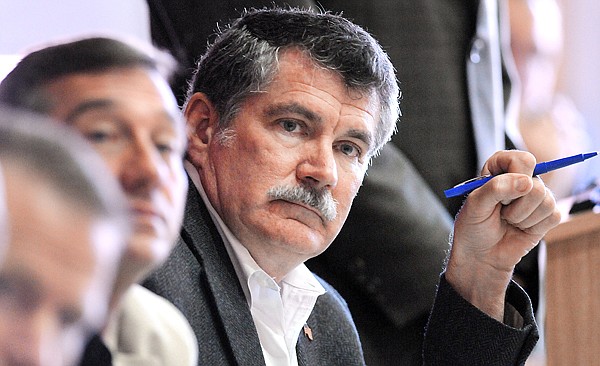Worries about wolves
Montana’s lone congressman got an earful from people concerned about wolves and their impacts on wildlife and livestock at a hearing Wednesday in Kalispell.
More than a 150 people filled the auditorium at the Flathead Valley Community College Arts and Technology building for the third hearing on wolves held in Montana this week.
The meeting was headed by a panel of about a dozen people, all of them advocates for restoring wolf management authority to the state of Montana.
A recent ruling by U.S. District Judge Donald Molloy of Missoula rescinded the federal government’s decision last year to remove wolves in Montana and Idaho from protection under the Endangered Species Act, which gave both states the authority to manage wolves.
Both states had wolf hunts last year, but hunts planned this year were ended by Molloy’s ruling.
Rehberg and other congressional delegates from Montana and Idaho have drafted several bills that would, in different ways, restore management authority to the states.
Rehberg heard repeated testimony Wednesday from panelists and audience members who maintain that Montana met all recovery goals for wolves in good faith that the state would be able to manage the species.
“By every standard, wolves are recovered — more than recovered,” said Kirk Murphy, a panelist representing the Rocky Mountain Elk Foundation. “The pendulum has swung too far.”
“I think Montana has proven that they can put a management plan together,” said Chuck Hunt, president of Flathead Wildlife Inc. “We proved that by our hunt last year, as well as Idaho.”
Several ranchers spoke about losing livestock to wolves. Rollins rancher Ed Jonas lost two valuable heifers in the Browns Meadow area two years ago to a pack that originally was estimated to have 10 wolves.
The Hog Heaven Pack turned out to have 28 wolves that were all destroyed by federal agents after they were deemed responsible for other livestock depredations west of Kalispell.
“Despite what you hear about the numbers ... I believe the counts are inaccurate,” Jonas said.
Montana Fish, Wildlife and Parks and U.S. Fish and Wildlife Service officials have long conceded that the state’s official wolf counts are minimums, and they acknowledge that there are more wolves on the landscape.
The official counts have exceeded recovery goals for several years in the Northern Rockies.
Brian Peck of Columbia Falls was one of a few wolf advocates who spoke Wednesday. He told Rehberg that Molloy rigidly followed the rule of law in his decision and he asserted that the decision to delist wolves was driven by politics and there is “no science” to support the decision.
In his concluding remarks, Rehberg addressed that claim head-on, saying that the goalposts for what wolf advocates consider to be adequate science will constantly shift.
“There are those in society who aren’t going to be satisfied with the science,” said Rehberg.
Because there will be two camps of science supporting or opposing delisting, “ultimately, it is going to be a political decision,” Rehberg said.
A long line of hunters testified to seeing wolves and far fewer moose, deer and elk in the field.
Montana Fish, Wildlife and Parks officials assert that an obvious decline in deer populations was largely driven by severe winter weather two years ago, but they acknowledge that predators — including a proliferation of wolves over the last few years — have had an impact on big game populations.
Hunter after hunter spoke about seeing fewer deer and elk in areas where they were once abundant.
Aaron Lasco, owner of Spirit Quest Archery in Kalispell, said he has gotten field reports from hundreds of hunters over the last 10 years and “the last three years have been devastating.”
He said he and other hunters spend huge amounts of time, covering large distances in the woods, and they are seeing far less game.
“It’s just a lack of game ... and these guys are serious. We are out there. We are pounding the dirt,” Lasco said.
Scott Smith, a hunter and houndsman from Whitefish, said he spotted a single elk track along with several wolf tracks in the Martin Creek drainage over the last week. He never saw an elk, but he did see a wolf that day.
In an interview after the hearing, Rehberg reiterated his position that a legislative remedy is necessary.
“I don’t second-guess the judge’s ruling,” he said. “But what I need to do is remove the reason for him to make that decision, because common sense would tell you that wolf has been [recovered] in Montana.”
Rehberg’s draft bill would amend the Endangered Species Act to delist wolves in Idaho and Montana and give the states “exclusive jurisdiction” over wolf management.
Another bill introduced by Montana Sens. Max Baucus and Jon Tester would delist wolves in the two states, both only when the Secretary of Interior approves their wolf management plans.
Another difference is that the Baucus-Tester bill would not permanently delist wolves; the U.S. Fish and Wildlife Service would retain the ability to restore their protected status if populations decline too far.
Reporter Jim Mann may be reached at 758-4407 or by e-mail at jmann@dailyinterlake.com.






